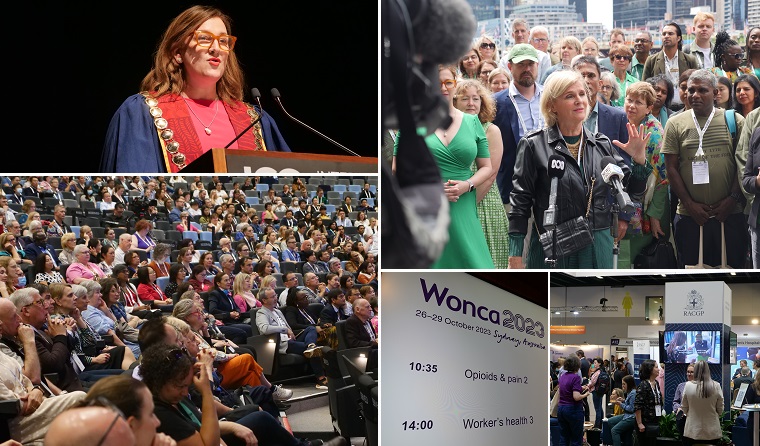GPs laud ‘enormity of WONCA’ as conference wraps up

Image credit: News GP / RACGP
Author: Michelle Wisbey | Royal Australian College of General Practicioners
Read the article HERE.
How many coffees does it take to fuel 4000 busy doctors for four days?
The answer to that all-important question is a whopping 6000 cups made with 80 kilograms of beans – and that was just the coffees brewed in the WONCA Exhibition Hall.
The 2023 World Conference has officially wrapped up for another year, bringing to an end more than 850 presentations, seven keynote addresses, and 58 topic areas covered.
A total of 4434 delegates walked the halls of Sydney’s International Convention Centre, taking in talks from the world’s leading experts in their fields.
Australian doctors were especially well represented at the 50th anniversary of the famous conference with 2857 attendees descending on Darling Harbour, while New Zealand had 112 people, followed by 109 from Japan, 88 from the Philippines, 83 from Singapore, 61 from China, and 60 from Qatar.
Some attendees even made the long journey solo, with single delegates hailing from Azerbaijan, Ethiopia, Iceland, Italy, Jamaica, Malta, Mongolia, Somalia, and Zimbabwe.
RACGP President Dr Nicole Higgins told newsGP the conference had been deemed a success by delegates, attendees, and presenters alike.
‘I sat there on the opening day and took the opportunity to just look up and just see the enormity of WONCA,’ she said.
‘It’s just massive and everyone has been so positive – the vibe, the feel, has been one of joy and I think that’s really what we all needed.’
It was in the Exhibition Hall that a correlation between stall popularity and food offerings quickly emerged.
Delegates and presenters lined up for 4200 luxury chocolates, 1350 popcorn buckets, and 2000 freshly made doughnuts.
IPN Medical Centres gave away 800 water bottles and 800 more coffee cups, SunDoctors handed out 507 lip balms, and 700 pens were pocketed from Torrens Health.
Meanwhile, reception staff could barely keep up with demand for RACGP tote bags.
In the theatres and the conference rooms, each presentation covered a different topic, from health equality to the need for climate action and GPs’ response to COVID, finishing with an inspiring call to action.
Broad themes like continuity of care, the threat of fragmentation, and family doctors’ work being undervalued and underfunded reinforced that while clinicians each have their own unique context, many issues are shared regardless of the country of origin.
Saturday was truly an example of shared global convergence, as delegates donned their favourite shade for Green Day.
Gathering in front of the news cameras, family doctors from across the world handed over an open letter calling for governments to combat the growing and ubiquitous health impact of climate change.
Dr Higgins said one of her conference takeaways was the reassurance and acknowledgement that other countries are sharing Australia’s challenges and can help in finding answers.
‘I’ve had the opportunity to talk about different solutions in different countries, but also to hear the stories of how other people work, and making those connections and networks,’ she said.
‘One thing I found is that everyone is going through the same challenges.
‘Every country’s got similar problems and we’re all facing similar issues – whether it be around valuing and funding general practice, around workforce shortages, or dealing with populations that are becoming increasingly complex.’
Across several award ceremonies, inspiring GPs were also recognised for their contribution to the profession.
Tasmanian GP Dr Christopher Hughes took home the prestigious Rose-Hunt Award for his unwavering commitment to his patients, while rural New South Wales GP Dr Richard Draper was named GP of the Year.
Dr Higgins said she was leaving the conference excited to put its lessons, key messages, and takeaways into practice.
‘I’ve reconnected with colleagues and friends and that’s always really energising,’ she said.
‘It makes me think, “what next? What can I do better? How can I make this happened?” And that’s great.’
More than 50 years after its humble beginnings in Melbourne, the conference has left Australian shores once again, with the baton now passed on to Portugal, which will host the next World Conference in Lisbon in 2025.